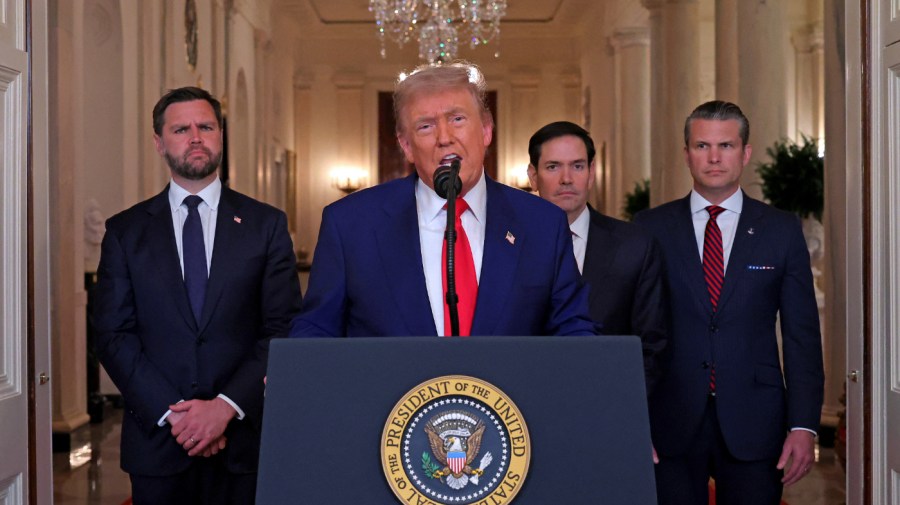How Trump can capitalize on autocrats’ setbacks

The defanging of Iran — chiefly by Israel, with a strong assist from President Trump and the U.S. Air Force — doesn’t just signal a dramatic power shift in the Middle East. It is also a setback to Iran’s senior partners in the anti-American axis — Russia and China.
Neither has offered their battered ally anything more than boilerplate denunciations of Israel and the U.S. for violating international law. For now, at least, the fearsome “Axis of Autocracies,” bent on disrupting the U.S.-led global order — China, Russia, Iran and North Korea — looks rather brittle.
Dictators rarely make reliable allies. Apart from coveting absolute power, each has little in common with other nations’ despots. Their pacts tend to be opportunistic and fleeting. Even as the tide of war turned against them, for instance, Nazi Germany and Imperial Japan never found a way to align their strategic goals or military strategies.
Alliances between liberal democracies seem to have more tensile strength. That’s because they are bound together by shared political beliefs and institutions, not just common adversaries.
Even Trump, the arch-realist, may be stumbling into that reality.
Having repeatedly threatened to pull America out of NATO, he reversed himself at last month’s summit in the Hague. The turnaround came after most European leaders agreed to hike their defense spending from 2 percent to 5 percent and heaped fulsome praise on Trump for knocking out Iran’s nuclear enrichment facilities.
In the afterglow of this unexpected show of Western solidarity, it is reasonable to ask if Trump also is capable of changing his disdainful approach to Ukraine. In a Thursday interview with NBC News, Trump appeared to be moving in that direction. He said he reached a deal to send Ukraine weapons via NATO, and “NATO is going to reimburse the full cost of those weapons.”
By resuming U.S. support for Ukraine’s fight for freedom, the administration could score another foreign policy win by tilting Europe’s balance of power in the West’s favor.
Compounding Russia’s horrendous losses in Ukraine — 250,000 battlefield deaths and nearly 1 million casualties — Israel’s devastating strikes on Iran and the fall of Syria’s pro-Russian dictator Basher al-Assad last year have gravely weakened Moscow’s strategic position in the Middle East.
The Islamic Republic casts itself as the divinely sanctioned leader of an Islamic holy war to eradicate the Jewish state and drive America, the “great Satan,” out of the region. It provides theological justification, money and weapons to an extensive network of proxies including Hamas, Hezbollah, Yemen’s Houthis and other jihadist groups operating in the West Bank, Syria and Iraq.
Last January, Iran signed a 20-year strategic agreement with Russian ruler Vladimir Putin. Tehran has supplied Russian forces in Ukraine with medium-range ballistic missiles and thousands of Shahed drones, while also helping Moscow build its own drone production plants based on Iranian designs and components.
But Syria’s takeover by Sunni rebels has deprived Moscow of airbases and a local stage for acting out its great power ambitions in the region. The new regime pointedly refrained from condemning Israel’s attacks on Iran and has reportedly has started talks to normalize relations with Jerusalem.
Iran’s humbling also is a rude jolt to China, the most powerful member of the anti-American bloc. President Xi Jinping regards Iran as a useful partner in undermining U.S. influence in the Middle East. Beijing also sees Iran as the western anchor in its sprawling Belt and Road initiative, which is building infrastructure and overland trade routes across central Asia and into Africa.
But its main strategic interest in Iran is oil. Using an elaborate illicit shipping system to evade U.S. sanctions, Beijing buys vast amounts of cheap Iranian oil to fuel its industries and build up a strategic reserve. Its heavy reliance on Iranian oil makes China acutely vulnerable to disruptions from Middle East turmoil.
In short, a weakened Iran is bad news for both China and Russia.
Can Trump capitalize on our adversaries’ setbacks? Fully unlocking the U.S. aid to Ukraine that Congress has already approved and paid for would be his strongest move. That would close a key rift with our NATO partners, deliver a major strategic reverse to Moscow and thereby devalue Xi’s heavy investment in his “strategic partnership” with Putin.
The hitch, of course, is that Trump shows little empathy for Ukrainian aspirations for independence and is weirdly deferential to Putin’s claims that Russia’s security demands Kyiv’s perpetual subservience to Moscow.
On the other hand, Trump is campaigning shamelessly for a Nobel Peace Prize. By giving Putin a strong incentive to negotiate a cease-fire with Kyiv, he just might earn one.
Europe stepped up aid to Ukraine after Trump turned off the spigots. But Kyiv relies heavily on intelligence assets and weapons only we can supply, especially Patriot air defense batteries to protect population centers from Russia’s ballistic missiles. Trump mentioned sending Patriot missiles to NATO for Ukraine during the NBC News interview.
All too familiar with Trump’s transactional approach to foreign policy, Ukraine President Volodymyr Zelensky has offered to buy the U.S. weapons it needs, with Europe mostly fronting the cash. But at that time, the White House approved only a pitifully inadequate $50 million in weapons sales.
Trump often seems to put greater store in preserving his personal relationship with Putin than in working with our allies to thwart Moscow’s neo-imperial ambitions in Europe. But geopolitics isn’t an episode of “Friends.”
To Trump’s bafflement, his Kremlin pal has repeatedly shown no interest in striking a peace deal with Kyiv that’s anything short of surrender. Instead, he has been running a summer offensive, hoping to crush Ukraine’s will to resist, as America sits on the sidelines.
It is time for the president to put aside his bromances with tyrants and put America’s strategic interests first.
Will Marshall is founder and president of the Progressive Policy Institute.